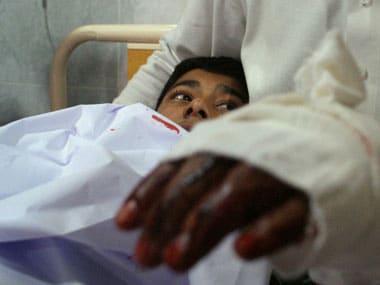This is not the time for Indians to gloat, but introspect on where blind faith can lead people: towards inhumanity. As regular victims of Pakistan-based terror groups like the Lashkar-e-Toiba and Jaish-e-Mohammed, most Indians will not deny a sense of schadenfreude over the Taliban’s horrible mass murders of children in a Peshawar army school today (16 December). But it is more important for us to learn the right lessons from it rather than just feel vindicated in our condemnation of terrorism. [caption id=“attachment_1852765” align=“alignleft” width=“380”]  An injured Pakistani student lies in bed at a hospital in Peshawar. AFP[/caption] The two lessons to learn from it are: theocracy carries within it the seeds of its down destruction; and two, never use a holy book to guide your actions without also using commonsense, compassion and reason. Blind faith that is not tempered by reason and human values can lead to unimaginable tragedies. That anyone can use children as targets for vengeance against their perceived enemies breaks every possible moral code known to humankind. You have to be terribly, terribly sick in the mind or so completely brainwashed by propaganda if you do not know the difference between right and wrong. Religion and faith are double-edged swords — they can be sublime and they can be dangerous, depending on who uses which holy book for what end. With apologies to true believers, we must assert that all holy books are actually written by human beings, and thus are riddled with all the faults and foibles of humans. Even if the words they contain were said by exalted human beings, they are still human efforts and cannot be taken as something beyond argument or reason. Commonsense should tell us that no matter what we would like to believe about our holy books, they are often contradictory. They contain both great thoughts and not-so-great ones. If you want to revere them, fine. But if you want to use them as a guide to every action, you have to do so along with your human judgment. You can go as wrong with the Koran as with the Bible or the Gita if you take every word in them literally. It is worth pointing out that it is we who make a book holy or unholy. Your religion is peaceful if you are peaceful. Your religion is tolerant if you are tolerant. Your religion exudes love if you exude love. A knife in the hands of a home-maker is different from a knife in the hands of a terrorist. It is we who make the knife something that helps prepare our food or an instrument for general slaughter. The Sydney Siege and the Peshawar Taliban attacks suggest that some misguided Muslims are too blinded by hatred to see the difference between their unholy actions and their supposedly holy beliefs. It may be tempting to list here all the grievances of the Muslim world against the west, or against Israel or India — or whoever they think has victimised them — but no matter what your grievance, you cannot get those grievances addressed by killing and maiming. In fact, the Taliban have ensured that ordinary Muslims have now been tarred with the brush of extremism. In a sense, this is what they hope to achieve. For the Taliban, the more ordinary Muslims are seen as part of terror, the more they will be forced to consider the Taliban as their only saviours. However, one hopes that Muslims everywhere will see through this game. The only way terrorism in the name of Islam can be vanquished is if the common Muslim everywhere decides to take them on and expose them. Taking on extremist elements is their job, not that of the rest of the world. For a simple reason: if the west or the non-Muslim world take them on formally — as George Bush tried and Barack Obama has been forced to by ISIS’s depredations in West Asia — the battle soon degenerates into an Islam versus Christianity situation. Given atavistic memories of the crusades, when Christian took on Muslim to establish their respective faiths as supreme, we will be back to those primeval battles in the modern world. That is the last thing one needs in a world that is already struggling to grow and reduce poverty. This is a time for Muslims to introspect and figure out how they are going to deal with the scourges called the Taliban, the Boko Haram, the al-Qaeda or ISIS. No one else can take them on. In India, too, it is time to introspect on where theocracy can lead us, even though we are far from that prospect as of now. But if we go down the slippery slope, even god cannot help us.
Indians may feel smug that Pakistan’s support of terrorism has now begun to bite them, but there is a different lesson we need to learn from the Taliban’s mass murder of children in Peshawar: theocracy kills its own
Advertisement
End of Article
Written by R Jagannathan
R Jagannathan is the Editor-in-Chief of Firstpost. see more


)

)
)
)
)
)
)
)
)



